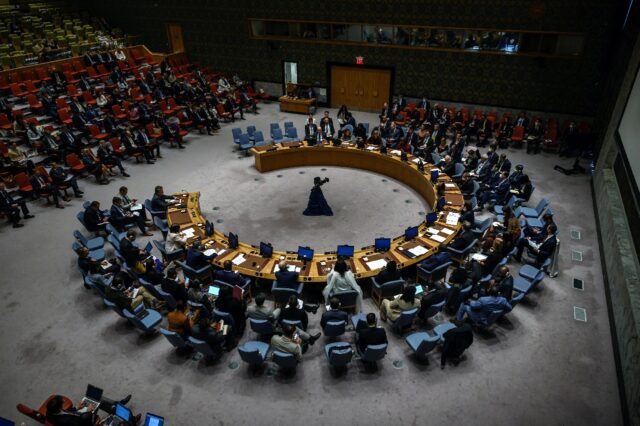A United Nations committee approved a draft resolution Friday calling on the International Court of Justice in the Hague to urgently issue its opinion on the legal consequences of allegedly denying the Palestinian people the right to self-determination, a move Israel’s envoy to the global body maintains will “endanger” the country’s future as well as any chance of peace with the Palestinians.
The vote in the General Assembly’s Special Political and Decolonization Committee was 98-17, with 52 abstentions.
Among those who voted in favor of the anti-Israel resolution was Ukraine, which has repeatedly demanded that Jerusalem assist Kyiv in its war with Russia, and the Jewish state’s Arab allies, including Bahrain, Egypt, Jordan, and the United Arab Emirates.
The resolution will now go to the 193-member assembly for a final vote before the end of the year, when it is virtually certain of approval.
The draft alleges Israel’s violation of Palestinian rights to self-determination “from its prolonged occupation, settlement and annexation of the Palestinian territory occupied since 1967, including measures aimed at altering the demographic composition, character and status of the holy city of Jerusalem, and from its adoption of related discriminatory legislation and measures.”
It would ask the court for an opinion on how these Israeli policies and practices “affect the legal status of the occupation, and what are the legal consequences that arise for all states and the United Nations from this status.”
The International Court of Justice, also known as the world court, is one of the U.N.’s main organs and is charged with settling disputes between countries. Its opinions are not binding. The ICC, on the other hand, prosecutes individuals.
This is not the first opinion sought from the court stemming from the nearly 75-year-old Israeli-Palestinian conflict.
In 2004, the court said a security barrier Israel had built, mainly inside the West Bank and east Jerusalem — which, along with the Gaza Strip, are territories Palestinians seek for their future state — was “contrary to international law.” The barrier has stopped hundreds of terrorists from infiltrating Israel and carrying out attacks.
The draft also demands Israel comply with the court’s 2004 decision and stop construction of the wall, dismantle it, and make reparations for all damage caused by its construction, “which has gravely impacted the human rights” and living conditions of Palestinians.
The call for a new opinion was one of six Palestinian-related resolutions approved by the committee on Friday.
Outgoing Prime Minister Yair Lapid on Sunday said Israel “strongly rejects” the resolution, describing it as another “unilateral Palestinian move that undermines the basic principles for resolving the conflict and may harm any possibility for a future process.”
“The Palestinians want to replace negotiations with unilateral steps. They are again using the United Nations to attack Israel,” Lapid said.
He said the resolution “will not change the reality on the ground, nor will it help the Palestinian people in any way. It may even result in an escalation. Supporting this move is a prize for terrorist organizations and the campaign against Israel.”
He went on to thank the countries that voted against the move and called on those that voted in favor “to reconsider their position and oppose it when it’s voted upon in the General Assembly.”
Before the vote, Israel’s U.N. Ambassador Gilad Erdan told U.N. member nations they had a choice on whether to support negotiations or “to be an accomplice in destroying any hope for reconciliation” and perpetuating the Israeli-Palestinian conflict.
He warned that “involving a judicial organ in a decades-old conflict only to dictate one side’s demands on the other ensures many more years of stagnation.”
“By coopting the court,” Erdan said, “the Palestinians are given the perfect excuse to continue boycotting the negotiating table to perpetuate the conflict.”
After the vote, the Palestinian U.N. ambassador, Riyad Mansour, expressed gratitude to member states that approved all six resolutions and cited Palestinian President Mahmoud Abbas’ speech at the annual General Assembly in September that urged for the mobilizing of “all the components of our international law-based order, including international justice.”
Mansour thanked the countries that supported the resolution and said that “nothing justifies standing with Israeli occupation and annexation, its displacement and dispossession of our people.”
“Our people are entitled to freedom,” he said. “This occupation will need to end.”
“There will come a day, a day when our people will bring the flag of Palestine over the churches of Jerusalem and to the mosques of Jerusalem and Haram al-Sharif,” Mansour added, referring to the Muslim name for the flashpoint holy site in Jerusalem’s Old City that Israeli’s refer to as the Temple Mount, which is Judaism’s holiest site and Islam’s third-holiest.
The Associated Press contributed to this article.

COMMENTS
Please let us know if you're having issues with commenting.